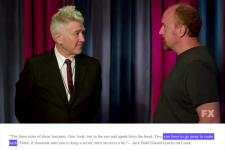sus
Moderator
Christian Bale as Alfred Borden & Fallon
Hugh Jackman as Angiers, Lord Caldlow, the Great Danton, Root
Michael Caine as John Cutter
Scarlett Johansson as Olivia
Rebecca Hall (Vicki Christina Barcelona) as Sarah Borden
David Bowie as Nikola Tesla
This is to Batman Begins (Bale/Caine) as Runaway Bride (Gere/Roberts) is to Pretty Woman. When a couple's this cute, you just gotta reunite ‘em for an encore.

Hugh Jackman as Angiers, Lord Caldlow, the Great Danton, Root
Michael Caine as John Cutter
Scarlett Johansson as Olivia
Rebecca Hall (Vicki Christina Barcelona) as Sarah Borden
David Bowie as Nikola Tesla
This is to Batman Begins (Bale/Caine) as Runaway Bride (Gere/Roberts) is to Pretty Woman. When a couple's this cute, you just gotta reunite ‘em for an encore.



